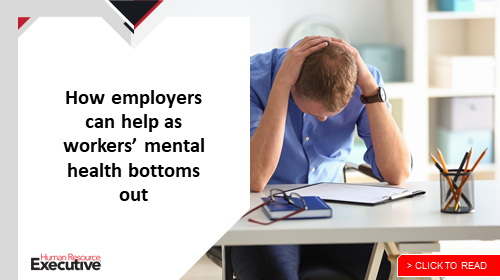As the country nears the third anniversary of the start of the COVID-19 pandemic, infection numbers have stayed steady for months and precautions have largely lifted—signaling a potential light at the end of the tunnel. However, the impacts of the last few years—particularly, the rise in mental health issues and burnout—have far from abated.
A new report from Aflac finds that 59% of workers are experiencing burnout of at least moderate levels. That’s a 7-point increase from this time last year—and about the same as in 2020, just months into the pandemic. As concerns about the economy flourish and inflation rises, some experts predict the mental health of employees will continue to worsen.
“We know that mental health issues come from a variety of places,” says Aflac CHRO Matthew Owenby. “There’s the global pandemic, financial stress, family issues, societal issues and, on top of all of that, we have had a lot going on in this country. So, [the burnout rate] doesn’t surprise me at all; even though we may be out of the worst of the pandemic, it’s still a tough situation for many people right now.”
That makes the role of employers even more critical, Owenby says. However, the survey found some stark differences in what employers and employees think about mental health support. For instance, about 80% of workers say they need healthcare coverage that includes mental health components, yet only about 60% have access to such. Meanwhile, 68% of employers rated their mental health efforts as much or somewhat better than a year ago.
The 2022-23 Aflac WorkForces Report is now in its 12th year, and Owenby says it’s not uncommon for it to uncover disconnects among employer and employee perceptions—but, given the dramatic shifts in the world of work in recent years, it’s more important than ever for employers to work to close those gaps.
Here’s more on what Aflac is doing to tackle mental health issues and burnout in its workforce:
HRE: How has Aflac evolved its approach to supporting mental health since the pandemic started?
 Owenby: The first thing is we started talking about it more as an issue. We recognized that this was something our employees were experiencing and we started a dialogue around how we could support them. As an employer, we provide counseling, grief counseling, health and mental wellness resources through our benefits programs, but we’re also working to make it safe to just talk about any issue—whether it’s anxiety, family issues or stress. We have a very employee-first culture, so as soon as we started hearing about issues [at the start of the pandemic], we knew we needed to address it. Aflac has 6,000 employees in the U.S. alone, so we have a nice subsection of the broader population—where we’re seeing issues in that broader population, we know our employees are experiencing them.
Owenby: The first thing is we started talking about it more as an issue. We recognized that this was something our employees were experiencing and we started a dialogue around how we could support them. As an employer, we provide counseling, grief counseling, health and mental wellness resources through our benefits programs, but we’re also working to make it safe to just talk about any issue—whether it’s anxiety, family issues or stress. We have a very employee-first culture, so as soon as we started hearing about issues [at the start of the pandemic], we knew we needed to address it. Aflac has 6,000 employees in the U.S. alone, so we have a nice subsection of the broader population—where we’re seeing issues in that broader population, we know our employees are experiencing them.
HRE: How have employees responded to the push to discuss mental health in the workplace?
Owenby: They love it. We bring in outside counselors to have lunch and learns, and it’s standing-room-only—they’re virtual, so metaphorically. They’re very, very popular. We’ve targeted them around a variety of mental health issues, and they’ve been very well-received. We haven’t perfected our strategy but we’re making a lot of progress.
HRE: How is the organization staying in tune with the changing needs of employees when it comes to benefits?
Owenby: Our benefits strategy is guided directly by our employees’ needs. We want to know what our employees want, how they feel about their benefits. In our recent survey, there was a disconnect mentioned: Employers believe they understand what employees want, but that’s often not the case. At Aflac, we make it a priority to understand what employees want and build our benefits program around that. That could include mental health offerings, and one of the most popular things we actually see [employees want] is pet insurance, which we’re able to offer. Even if we can’t provide exactly what people want, we want to know where they could be going so we can understand what we should be planning for. We stay on top of what people are thinking by asking a lot of questions, doing a lot of focus groups and surveys.
HRE: Where do you think HR leaders need to keep their focus in 2023 when it comes to strengthening how they support employees’ holistic health?
Owenby: It’s got to be around mental health and financial security. Our survey suggests that both are linked. And coming around the corner is going to be more of the same. Financial distress is going to keep happening because of the macroeconomic conditions right now. And mental health issues are something we’ve been dealing with for years, given the double whammy of societal issues happening and then the pandemic; it’s unlikely that any employees came out of the pandemic better in terms of mental health than when it started. So, employers need to be able to understand the need and be in tune with their employees. They can step up and provide value that ultimately can attract new employees—but to keep them you have to ensure you’re extending your benefits to truly care for your people.

